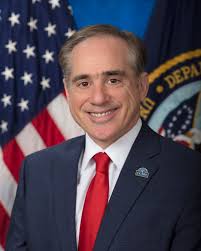By Isaac Arnsdorf/ProPublica
President Donald Trump personally directed administration officials to report to one of his largest donors, Marvel Entertainment chairman Ike Perlmutter, according to a new book by former Secretary of Veterans Affairs David Shulkin.
Starting with Shulkin’s interview for the cabinet post, Trump routinely dialed Perlmutter into meetings and asked if the secretary was keeping Perlmutter informed and happy, Shulkin wrote.
Perlmutter would call Shulkin as often as multiple times a day, and White House officials such as Stephen Miller would scold Shulkin for not being in close enough contact with Perlmutter and two of his associates at Mar-a-Lago, Trump’s private club in Florida.
“I didn’t reach out to these guys – these guys had a prior relationship with the president and were advising him,” Shulkin, who was fired by tweet in March 2018, said in an interview. “There probably wasn’t too many times I met with the president when he didn’t say, ‘What’s happening with Ike?'”

The unusual influence over the VA wielded by Perlmutter, along with doctor Bruce Moskowitz and lawyer Marc Sherman, was first revealed by a ProPublica investigation in August 2018, prompting ongoing investigations by the House Veterans’ Affairs Committee and the Government Accountability Office.
But Shulkin’s book provides new details on Trump’s direct role in initiating and encouraging the arrangement.
“There was a ‘second track’ of VA decision-making led by the president’s alternative advisers that didn’t include me,” Shulkin wrote in the first inside account by a former member of Trump’s cabinet. “Ike, Bruce and Marc had the president’s ear in ways that I did not, even as his cabinet secretary.”
The White House didn’t immediately respond to requests for comment. In a statement, Perlmutter, Moskowitz and Sherman said they had no official role or responsibilities at the agency. “We were informal advisors offering our help in service of a cause we believe in,” they said. “The fact that Mr. Shulkin chose to read political tea leaves and interpreted our role otherwise is disappointing, but ultimately those were mistakes he needs to account for, not us.”
In one incident, Shulkin attended a dinner with then-Defense Secretary Jim Mattis at the White House. Perlmutter, his wife and Moskowitz were already there, visiting with Trump in the residence. (Mattis didn’t respond to a request for comment.)
“This was the first time it hit me just how much the Mar-a-Lago crowd was going to be involved in my new life and in my ability to lead the VA,” Shulkin wrote. “I didn’t need written instructions to understand this two-tiered social event – the guests who waited downstairs and the guests who were entertained upstairs – as a directive. Essentially, ‘These people are my friends and confidants, and I expect you to listen to them and make them happy.'”
Perlmutter and his wife contributed almost $7.5 million to Republican causes in 2016, ranking them among Trump’s biggest backers, according to federal data compiled by the Center for Responsive Politics.
In 2018, the couple donated $2 million to Ron DeSantis, a close Trump ally, in his successful race to become governor of Florida. They also lent him their private plane.
Perlmutter shuns publicity, refusing interviews and photographs, but occasionally surfaces in court proceedings, including an acrimonious neighborhood feud and a New York police officer’s testimony that he got tickets to Marvel premieres and helped Perlmutter renew his gun permit.
He frequents Mar-a-Lago and, at his nearby oceanfront apartment, collects exotic fish; Shulkin (a physician by training) observed that the Perlmutters’ aquarium required so much special equipment that “it looked like they were operating a fish intensive care unit.”
Trump gave Perlmutter and his associates sweeping influence over the VA – the second-largest federal agency, with a $200-plus billion budget and almost 400,000 employees providing health care services and compensation benefits to 9 million veterans – despite their lack of any relevant experience. None of them has ever worked in government or served in the U.S. military (Perlmutter served in the Israeli Army in the 1967 war).
Perlmutter was familiar with much-publicized scandals at the VA’s hospitals and had a rosy view of private health care, Shulkin said. On one of their first calls, Shulkin wrote, Perlmutter suggested they go around the country showing up at VA hospitals unannounced “to see what was really going on.” When Shulkin said he didn’t think it would be appropriate for a private citizen to be conducting unplanned inspections, Perlmutter said, “OK, we’ll give them 10 minutes’ notice.”
“Often their advice was unusable, because none of these men seemed to have much of an understanding of how the VA worked, nor did they possess any health system management experience,” wrote Shulkin, who led the VA’s health division before becoming secretary and previously ran private hospitals. “Most concerning was that these VA ‘advisers’ had never even been to a VA facility (which was also true of the president and his senior staff).”
When Shulkin did bring Perlmutter on a tour of the VA in West Palm Beach, Perlmutter seemed genuinely surprised by the appearance and orderliness of this facility. Perlmutter pressed patients for complaints – “he seemed adamant about finding dissatisfaction, or better yet, horror stories,” Shulkin wrote – but heard only praise, according to the book.
 Shulkin
Shulkin
The book recounts that Shulkin and the trio structured their interactions to avoid triggering disclosure requirements. Shulkin said he asked the agency’s lawyers about the propriety of the Mar-a-Lago trio’s involvement, since a Watergate-era sunshine law requires federal agencies to disclose input from outside advisers. Shulkin said he explained the law to Perlmutter and Moskowitz, and they didn’t want the obligations of becoming an official advisory committee. So they agreed to give advice “as individuals.”
“I also knew the limitations placed on private citizens meddling in government affairs, and I was always cautious to make sure that these three did not cross the line,” Shulkin wrote.
Since the Mar-a-Lago advisers had no official positions, they were not subject to laws requiring federal employees to disclose and divest assets to avoid conflicts of interest. Still, Shulkin said he never saw them use their influence for personal gain. “Truthfully,” he wrote, “I think they mostly wanted to feel useful.”
And they were useful to Shulkin, at least at first, as a sounding board and conduit to Trump. But they later grew frustrated that Shulkin wasn’t communicating enough and told him he’d lost their confidence. The three aligned themselves with other political appointees at the VA who distrusted Shulkin because he served in the Obama administration and accused him of undermining Trump’s campaign promise to push more veterans’ health care into the private sector.
During one visit to Mar-a-Lago, Sherman followed Shulkin into the men’s room and, after checking that no one else was around, told him: “Don’t touch the politicals. You’re playing with fire.”
Once the “politicals” impugned Shulkin to Perlmutter, according to the book, Perlmutter poisoned the president’s view of him. Trump had always been publicly effusive toward Shulkin, but after one trip to Mar-a-Lago he wouldn’t acknowledge him and avoided eye contact. John Kelly, then the chief of staff, told Shulkin that Trump was upset with him because of what he heard from his friends in Florida. (Kelly didn’t respond to a request for comment.)
Asked whether he was referring to Perlmutter, according to the book, Kelly responded, “Yes, that guy tells POTUS what to do despite not knowing what he’s talking about.”
Shulkin called Perlmutter and demanded, “What did you do?” but Perlmutter refused to respond, Shulkin wrote.
Shulkin’s interactions with the Mar-a-Lago trio are just one thread in a detailed, diarylike account of his tumultuous tenure at the VA. He also recounts the policy and organizational changes he led.
And Shulkin defends himself against findings, in a report by the agency’s inspector general, that he misused government funds on a European trip, a scandal that became ammunition for his internal enemies.
“Obviously I decided that it was important to describe the relationship with the Mar-a-Lago people, but I really don’t want that to be the legacy of this book,” Shulkin said in the interview. “I spent three years working hard to fix the system, and I actually felt like we were making progress and we were on a path to making this a sustainable modern system. And then my time got cut short. So I felt like it was an obligation of mine to put down on paper what I felt was working and how I was doing it so that hopefully people in the future might refer to it and learn something from it.”
The stakes for veterans could not be higher, Shulkin wrote, since the VA’s other Trump appointees were determined to privatize more of their health care. Shulkin believes that’s not the best outcome for veterans, he wrote, but it’s exactly the path the agency has taken since his ouster.
Shulkin’s successor, Robert Wilkie, has denied having an agenda to privatize the VA. But in June he approved new rules to dramatically expand the circumstances when the agency will pay to send veterans to private doctors instead of treating them in government-run health centers.
Shulkin said this approach will cost more and result in worse care. A VA spokeswoman said, “That’s a false, fringe view.”
“Empowering political appointees, with no experience in health care, no interest in involving industry experts, and no accountability to voters, will prove to be one of the larger mistakes of the Trump administration,” he wrote. “The path now chosen, if allowed to continue, will leave veterans with fewer options, a severely weakened VA, and a private health care system not designed to meet the complex requirements of high-need veterans. While largely unaware of his political appointees’ scheming, President Trump was most likely pleased with the result, because it fit well into a political sound bite and was consistent with his campaign platform. Most likely he does not realize the long-term implications.”
Do you have access to information about the VA that should be public? E-mail isaac.arnsdorf@propublica.org. Here’s how to send tips and documents to ProPublica securely. For more coverage, read ProPublica’s previous reporting on the VA.
–
See also:
* AP: Trump Mulled Order To Close Parts Of VA Health System, Shulkin Says In New Book.
* NPR: Trump’s Former VA Secretary Describes ‘Toxic’ Washington Culture In New Book.
* Newsweek: Trump’s Former VA Secretary Compares Meeting With Kellyanne Conway And Jared Kushner To Saturday Night Live Sketch.
–
Comments welcome.
Posted on October 23, 2019


